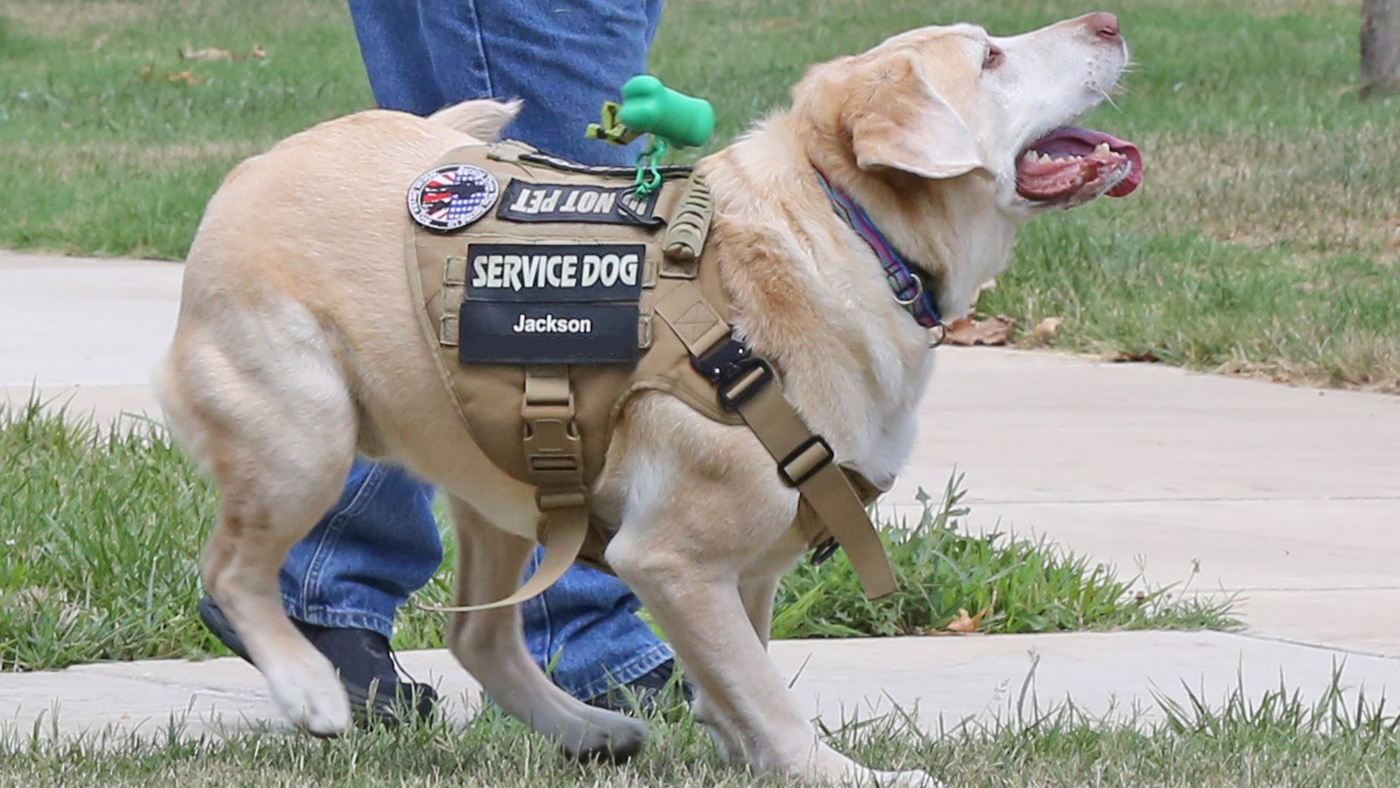A Veteran’s service dog knows a panic attack is coming before it appears.
After decades of avoiding facing the traumatic events Renè Toney experienced in Kuwait and treating her post-traumatic stress disorder (PTSD) with a medication-only treatment plan, she lost her job, her partner and nearly her home and her life.
Toney separated from the Army after 13 years of service. During a previous deployment to Kuwait, she was triaging enemy prisoners of war when the events that caused her trauma occurred. For years she was regularly triggered by sundown and relived her experience when the sun began to set.
Confronting trauma
These days, Toney finds herself doing the hard work she spent so many years avoiding through prolonged exposure therapy with support from a yellow Labrador Retriever, Jackson, her service dog.
Prolonged Exposure is a psychotherapy also known as talk therapy, and it is used to decrease PTSD symptoms by gradually approaching trauma-related memories that the Veteran has been avoiding.
Service animals
Service dogs are trained to identify the Veteran’s unique stressors and disrupt the symptoms before they escalate any further. Jackson’s service supports Toney’s daily life while she is out in public, at home in bed, and during therapy sessions at Coatesville VA, where she is now facing her PTSD.
When a session triggers a flashback, Toney is unaware of anything happening around her. Jackson will instantly go from laying on the floor to being pressed up against her and will remain by her side. “When it’s all over and you sort of come out of that imaginary process, he’s there,” she said. “Jackson does an enormous amount for me in terms of panic and anxiety attacks. He will let me know long before I know that a panic attack or an anxiety attack is coming.”
Jackson, who is trained to the Americans with Disabilities Act standards, will lean hard into Toney. “He will not leave that position until that attack is done. And even though I may not feel it anymore, it’s not done until he knows it’s done,” she said.
On call 24/7
Jackson is on call for Toney 24/7, but he is not on duty every minute of the day. “When his vest is on, he is locked in on me and whatever it is I need.”
During downtime, he gets to take the vest off. His favorite word and his favorite game is frisbee. “He will run a frisbee until you do not throw it anymore.” Toney makes sure he gets to play as often as she can.
“His service is a very real service. He works really hard. I’m blessed and thankful because, otherwise, my life would be very different and my world would be much smaller,” she added.
Veterans who are ready to face the trauma behind their PTSD can get help in finding a therapist or review self-help and coping tools to manage stress.
If you are experiencing a crisis, call the Veterans Crisis Line at 988 and then press 1 to speak with a responder qualified to support Veterans or text 838255.
Topics in this story
More Stories
Bob Jesse Award celebrates the achievements of a VA employee and a team or department that exemplifies innovative practices within VA.
The Medical Foster Home program offers Veterans an alternative to nursing homes.
Watch the Under Secretary for Health and a panel of experts discuss VA Health Connect tele-emergency care.








THIS IS A REMARKABLE STORY, ABOUT (P.T.S.D.) ISSUES. I AM A VIETNAM VET AND SUFFER WITH NIGHTMARES, WHICH INVOLVE (I’M ALWAYS RUNNING FOR HELP). THE HUGEST ORDEAL OF WHAT HAPPENED, THAT CAUSED MY (P.T.S.D.) DIAGNOSIS, I REMEMBER THE “RUNNING PART” TO SEEK MEDICAL HELP, FOR MY INJURIES. WHEN THE NIGHTMARES OCCUR, AS I AM RUNNING, I SEE HUMAN BEINGS IN MY PATHWAY, THAT HAVE DIFFERENT HEAD FIGURINES. I TRIED TO GET A SERVICE DOG, THRU THE VA FOR NIGHTMARES, THAT WAS TRAINED, TO WAKE ME UP FROM THE NIGHTMARES. I WAS DENIED BY THE VA FOR A SERVICE DOG. WELL AFTER (8 FAILED MARRIAGES), I DID WHAT I THOUGHT WOULD BE IMPOSSIBLE. I NOW HAVE A SERVICE DOG, THAT REQUIRED (2 YEARS) OF TRAINING. (YES) I TRAINED MY SERVICE DOG “MYSELF”. HIM AND I HAVE BEEN TOGETHER FOR (10 1/2 YEARS.
Love the story. Absolutely beautiful! Every VA office needs to understand how important our service dogs are! Me and my service dog (from DogsInc) have been together for six+ years. She is trained to perform tasks that mitigate my physical/mental impairment/disability, to Americans with Disabilities Act standards. Even so, the VA has REJECTED my requests for prosthesis to recognize us as a team!